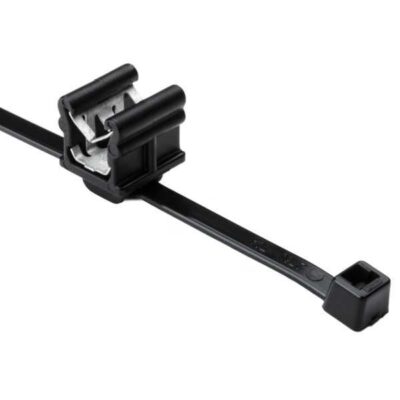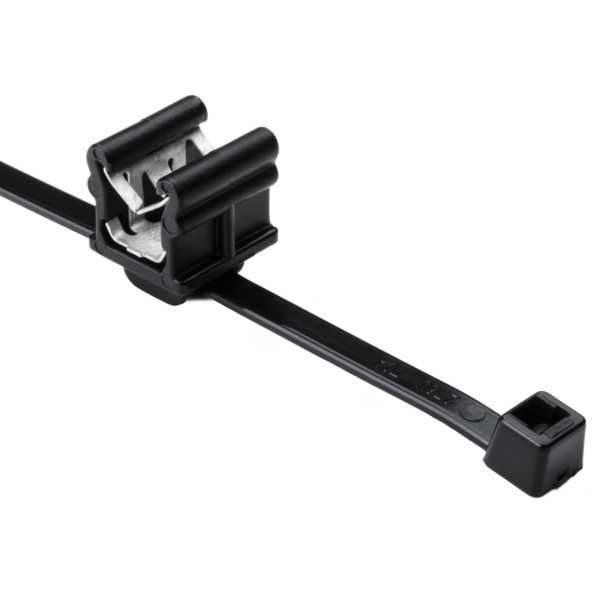

Tiny Zip Ties Guide
Tiny zip ties are perfect for delicate bundling tasks where standard ties are too bulky. This guide covers their applications and advantages.
Are you tired of tangled cables and messy wires? Look no further! In this article, we will explore the world of tiny zip ties and their alternatives, helping you find the best solution for your cable management needs. From the tiniest zip ties to the opinions of professionals, we've got you covered. So, let's dive in and discover the wonders of cable organization!
- Learn about small zip ties and their uses
- Explore the different types of small zip ties available
- Discover alternative methods for cable management
- Gain insights from Reddit users on cable management techniques
- Get expert advice on organizing cables and wires
- Compare the pros and cons of different cable management options
- Find recommendations for choosing the best solution for your needs
Exploring Small Zip Ties: The Smallest Zip Ties Available and Their Uses
When it comes to cable and wire management, small zip ties are a versatile tool that can make a big difference. In this section, we will take a closer look at the smallest zip ties available on the market and explore their various uses. Whether you're dealing with a tangle of cables behind your TV or organizing wires in a data center, small zip ties can provide a simple and effective solution.Definition and Characteristics of Small Zip Ties
Small zip ties, also known as miniature nylon cable ties or mini cable ties, are flexible straps with teeth on one end that lock into a ratchet on the other end, securing items in place. These zip ties come in various sizes and lengths, with the smallest ones measuring as little as 2.5 inches long and 0.05 inches wide. They are typically made from durable nylon, which is resistant to corrosion and chemicals.Common Uses for Small Zip Ties
Small zip ties find applications in a wide range of settings and industries. In the electrical and electronics field, they are commonly used for managing cables and wires in electronic devices, computers, and data centers. In the automotive industry, small zip ties are used to secure hoses and cables in cars and trucks. They are also popular for home organization, where they can be used for bundling cords and organizing small items. Additionally, small zip ties have applications in gardening for training and supporting plants.Materials Used to Make Small Zip Ties
As mentioned earlier, small zip ties are primarily made from nylon due to its durability and resistance to corrosion and chemicals. Nylon zip ties are known for their strength and reliability. However, it's worth noting that some small zip ties are also made from wire, which can provide additional flexibility and strength in certain applications.Examples of How to Use Small Zip Ties
Let's take a look at some practical examples of how small zip ties can be used:- Bundling cables and wires: Use small zip ties to keep your cables and wires neatly organized, preventing them from tangling and creating a clutter-free environment.
- Securing hoses and pipes: Small zip ties can be used to secure hoses and pipes in place, ensuring they stay in position and minimizing the risk of leaks or damage.
- Organizing small items: Whether it's keys, pens, or tools, small zip ties can help keep your small items organized and easily accessible.
- Attaching tags and labels: Use small zip ties to attach tags or labels to items, making it easier to identify and locate them when needed.
Benefits and Limitations of Small Zip Ties
Small zip ties offer several advantages that make them a popular choice for cable and wire management. They are durable and long-lasting, able to withstand various environmental conditions. Additionally, they are resistant to corrosion and chemicals, ensuring their reliability over time. Small zip ties are also easy to use and versatile, available in various sizes and lengths to suit different needs. However, it's important to be aware of the limitations of small zip ties as well. Once tightened, they can be difficult to remove, which may not be ideal for situations where cables or wires need to be frequently adjusted or replaced. There is also a potential risk of damaging cables or wires over time if the zip ties are over-tightened.Exploring Different Cable Management Methods on Reddit
When it comes to securing cables, people have different opinions and preferences. Reddit, a popular online community, provides a platform for users to share their experiences and insights on various topics, including cable management. In this section, we will delve into the discussions on Reddit regarding different methods of securing cables and wires.Discussion on Different Methods of Securing Cables
On Reddit, users have shared their preferred methods for securing cables, ranging from zip ties to velcro straps, tape, and more. The discussions highlight the pros and cons of each method and provide valuable insights into the effectiveness and practicality of different cable management options.Exploring Alternatives to Small Zip Ties
While small zip ties are a popular tool for cable and wire management, there are alternative options available that may better suit your needs. In this section, we will introduce you to some of these alternatives, including tape, metallic strings, and velcro. We will explore the advantages and disadvantages of each option and compare them to small zip ties and magnetic cable ties.Advantages and Disadvantages of Using Velcro as an Alternative
Velcro presents a popular alternative to zip ties, suitable for securing wires or cables. One advantage of Velcro is its ease of adjustment and reusability. Moreover, it accommodates irregular shapes and treats cables and surfaces gently. However, Velcro is not as durable as zip ties or Cloop magnetic cable ties.Comparison to Zip Ties and Magnetic Cable Ties
When comparing these alternatives to small zip ties and magnetic cable ties, it's important to consider your specific needs and requirements. Small zip ties offer durability, resistance to corrosion and chemicals, and versatility in various sizes and lengths. Magnetic cable ties provide a durable and easy-to-use alternative to traditional zip ties for certain applications. Tape, metallic strings, and Velcro offer their own advantages and disadvantages, and the best choice will depend on factors such as the level of strength and security required, ease of use, and the specific application.Preferred Methods and Tools for Organizing Cables and Wires
IT professionals and experts have tried and tested various methods and tools for cable management, allowing them to develop preferences based on their experiences. In this section, we will delve into their preferred methods and tools, such as cable trays, cable raceways, and cable management sleeves. These professionals understand the importance of efficient cable management in maintaining a clean and organized workspace, and their insights can help you make informed decisions about the best methods and tools for your specific needs.Tips and Recommendations for Effective Cable Management
Alongside their preferred methods and tools, IT professionals and experts also have valuable tips and recommendations for effective cable management. These tips can range from simple tricks for preventing cable tangling to more advanced techniques for organizing cables in data centers. By following their advice, you can optimize your cable management practices and create a more efficient and organized environment.Some common tips and recommendations from IT professionals and experts include:
- Labeling cables to easily identify their purpose and destination.
- Using cable ties or Velcro straps to bundle and secure cables.
- Implementing cable management solutions, such as cable trays or raceways, to keep cables organized and prevent tangling.
- Separating power and data cables to minimize interference.
- Regularly inspecting and maintaining cable management systems to ensure they remain effective.
Tiny Zip Ties Comparison
CableTiesUnlimited.com presents a diverse selection of metal clip cable ties tailored to accommodate a myriad of applications. Each tie differs in terms of length and strength, allowing users to choose the most suitable product for their specific needs. Here's a more in-depth look into these three offerings: In the world of wire management and assembly environments, the quality of your tools is paramount. This is where HellermannTyton's collection of Cable Tie & Edge Clips truly stands out. Designed meticulously to deliver top-notch performance, this product range ensures that your wiring needs are catered to with precision.HellermannTyton 156-00541 Cable Tie & Edge Clip
 HellermannTyton 156-00541 Cable Tie flaunts an impressive length of 8 inches and a sleek width of 0.18 inches. Its black hue is classic, ensuring it blends seamlessly with most environments. This cable tie, crafted from a unique combination of both heat-stabilized (PA66HS) and high-impact modified (PA66HIRHS) Polyamide 6.6, boasts a robust tensile strength of 50 lbs. hi
HellermannTyton 156-00541 Cable Tie flaunts an impressive length of 8 inches and a sleek width of 0.18 inches. Its black hue is classic, ensuring it blends seamlessly with most environments. This cable tie, crafted from a unique combination of both heat-stabilized (PA66HS) and high-impact modified (PA66HIRHS) Polyamide 6.6, boasts a robust tensile strength of 50 lbs. hi
HellermannTyton 156-00553 Cable Tie & Edge Clip
 This cable tie mirrors the dimensions and strength of the aforementioned product. Sporting an 8-inch length and av 0.18-inch width, it also impresses with a 50lb tensile strength. Crafted from the tried and tested Polyamide 6.6 in both its heat stabilized (PA66HS) and high impact modified forms (PA66HIRHS), it promises durability.
This cable tie mirrors the dimensions and strength of the aforementioned product. Sporting an 8-inch length and av 0.18-inch width, it also impresses with a 50lb tensile strength. Crafted from the tried and tested Polyamide 6.6 in both its heat stabilized (PA66HS) and high impact modified forms (PA66HIRHS), it promises durability.
HellermannTyton 156-00555 Cable Tie & Edge Clip
 This tie differs slightly. While retaining the core dimensions, tensile strength, and material construction of its siblings, it has undergone specific tailoring for panels ranging from 3 to 6 mm.
This tie differs slightly. While retaining the core dimensions, tensile strength, and material construction of its siblings, it has undergone specific tailoring for panels ranging from 3 to 6 mm.
